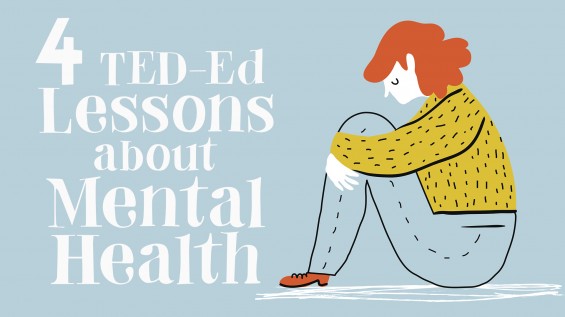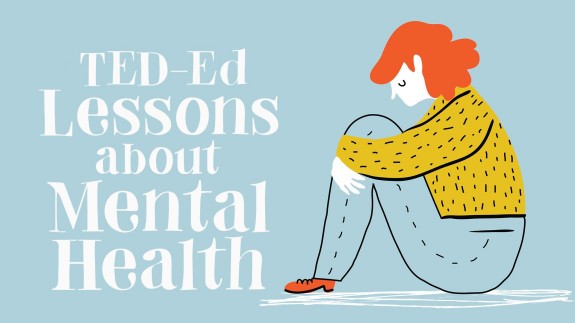
8 TED-Ed Lessons about mental health
Depression, bipolar disorder, OCD, narcissism, PTSD, chronic stress, schizophrenia— these medical conditions impact millions of people around the world, yet are often misunderstood. How much do you know about the symptoms and treatments?
In honor of Mental Health Awareness Month, watch these 8 TED-Ed Lessons:
1. What is depression?
Depression is the leading cause of disability in the world; in the United States, close to ten percent of adults struggle with the disease. But because it’s a mental illness, it can be a lot harder to understand than, say, high cholesterol. Helen M. Farrell examines the symptoms and treatments of depression, and gives some tips for how you might help a friend who is suffering. Watch this TED-Ed Lesson below.
2. What is bipolar disorder?
The word bipolar means ‘two extremes.’ For the many millions experiencing bipolar disorder around the world, life is split between two different realities: elation and depression. So what causes this disorder? And can it be treated? Helen M. Farrell describes the root causes and treatments for bipolar disorder. Watch this TED-Ed Lesson below.
3. Debunking the myths of OCD
There’s a common misconception that if you like to meticulously organize your things, keep your hands clean, or plan out your weekend to the last detail, you might be OCD. In fact, OCD (Obsessive Compulsive Disorder) is a serious psychiatric condition that is frequently misunderstood by society and mental health professionals alike. Natascha M. Santos debunks the myths surrounding OCD.
Watch this TED-Ed Lesson below.
4. The psychology of narcissism
Narcissism isn’t just a personality type that shows up in advice columns; it’s actually a set of traits classified and studied by psychologists. But what causes it? And can narcissists improve on their negative traits? W. Keith Campbell describes the psychology behind the elevated and sometimes detrimental self-involvement of narcissists. Watch this TED-Ed Lesson below.
5. The psychology of post-traumatic stress disorder
Many of us will experience some kind of trauma during our lifetime. Sometimes, we escape with no long-term effects. But for millions of people, those experiences linger, causing symptoms like flashbacks, nightmares, and negative thoughts that interfere with everyday life. Joelle Rabow Maletis details the science behind post-traumatic stress disorder, or PTSD. Watch this TED-Ed Lesson below.
6. How stress affects your brain
Stress isn’t always a bad thing; it can be handy for a burst of extra energy and focus, like when you’re playing a competitive sport or have to speak in public. But when it’s continuous, it actually begins to change your brain. Madhumita Murgia shows how chronic stress can affect brain size, its structure, and how it functions, right down to the level of your genes. Watch this TED-Ed Lesson below.
7. The truth about electroconvulsive therapy (ECT)
In 1982, a young nurse was suffering from severe, unrelenting depression. She couldn’t work, socialize or concentrate. One controversial treatment changed everything: after two courses of electroconvulsive therapy (ECT) her symptoms lifted. So what exactly is electroconvulsive therapy and why is it so stigmatized? Helen M. Farrell details the history and evolution of ECT. Watch this TED-Ed Lesson below.
8. What is schizophrenia?
Schizophrenia was first identified more than a century ago, but we still don’t know its exact causes. It remains one of the most misunderstood and stigmatized illnesses today. So what do we actually know about its symptoms, causes, and treatments? Anees Bahji investigates. Watch this TED-Ed Lesson below.




Really interesting, could you do a video about adhd ?
Thank you for raising awareness about mental health. I found the videos very informative and interesting and I would recommend it to everyone to read and have better understanding about mental health so we could all have the ability to understand and support friends and people living with mental health issues. Thank you again
Best regards
Fetin
Current research into the microbiome and how gut health affects the brain is vital, yet no mention of food as medicine herein.. a rather glaring disconnect. Thank you for a great presentation!
I think narcissism is due to intergenerational emotional abuse in the family.
Thanks for sharing such a great blog.The blog is very informative it gives information about what is depression,what is bipolar disorder and the psycology of narcissism.This blog will hepl many people who are sufferung from it.
Thank you for such informative articles. They are useful for people who are suffering from mental health issues, useful for carer/s, family members & friends of the sufferer. It is also raising awareness & lessening stigma in the community through education of such issues.
Do you have any articles or videos about suffering from co-morbid of any mental health conditions mentioned above? As in many circumstances, a person suffering from mental health issues doesn’t suffer from only mental health conditions but at least two?
TED, thank you very much for this well-written informative post. Would you kindly consider doing one of these segments, perhaps even animated, on anxiety and ADD/ADHD?